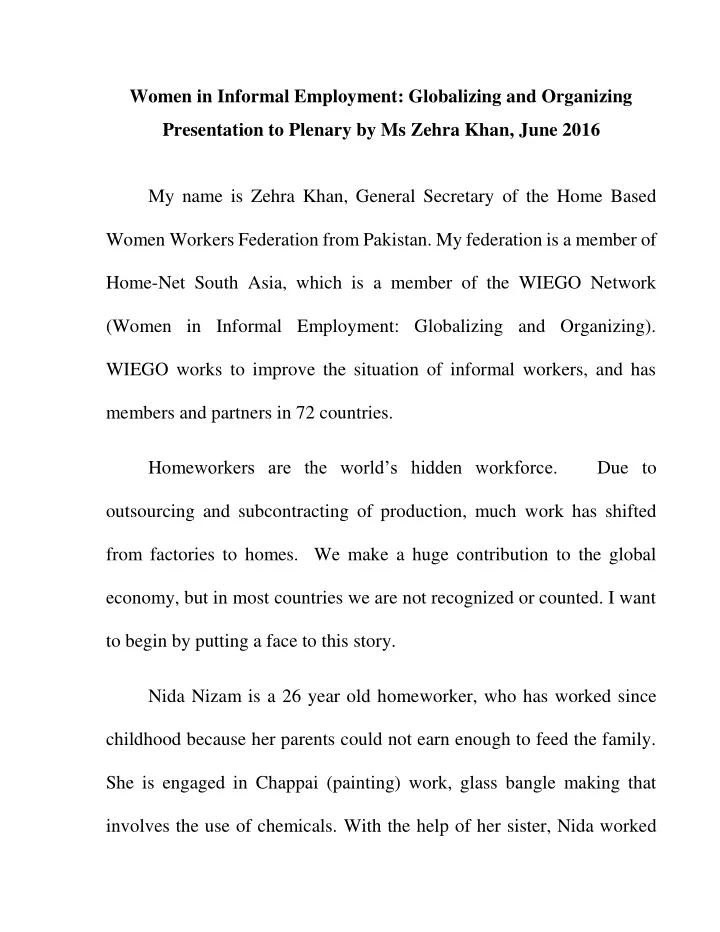

Women in Informal Employment: Globalizing and Organizing Presentation to Plenary by Ms Zehra Khan, June 2016 My name is Zehra Khan, General Secretary of the Home Based Women Workers Federation from Pakistan. My federation is a member of Home-Net South Asia, which is a member of the WIEGO Network (Women in Informal Employment: Globalizing and Organizing). WIEGO works to improve the situation of informal workers, and has members and partners in 72 countries. Home workers are the world’s hidden workforce . Due to outsourcing and subcontracting of production, much work has shifted from factories to homes. We make a huge contribution to the global economy, but in most countries we are not recognized or counted. I want to begin by putting a face to this story. Nida Nizam is a 26 year old homeworker, who has worked since childhood because her parents could not earn enough to feed the family. She is engaged in Chappai (painting) work, glass bangle making that involves the use of chemicals. With the help of her sister, Nida worked
for approximately 10 hours a day and got 5 rupees per bunch of 365 bangles. The sisters completed 10 bunches daily and got 50 rupees per day together. Contractors often did not pay them, and would disappear from the neighborhood. The chemical fumes damaged her sister's lungs and the family sold their home to pay for her treatment, but she died. Nida continues to make bangles -- sometime she eats and sometimes not. This is a familiar story amongst homeworkers who supply both domestic and global supply chains in Pakistan, in Asia more generally, Latin America, and Eastern Europe. The majority of the homeworkers are women. They use their homes as their workplace, pay for utilities used in production, such as electricity, gas, water. They buy and maintain their own equipment, which often includes a generator to compensate for load shedding of electricity. These are production costs . They also carry the risks of production, such as delayed or cancelled orders, unreliable supply of raw materials, delayed payments, and rejected goods. Many work, like Nida, in poor conditions, facing repetitive and hazardous work, 10 to 14 hours a day, and often longer. Most
homeworkers are paid a piece-rate, which is lower than what factory workers in the same supply chains are paid. As homeworkers are not recognized as workers, in many countries they have no rights to organize as unions and cannot bargain collectively. They have no social protection. Often if they try to negotiate individually with contractors for higher piece rates, they lose their work. The ILO holds its Centenary in 2019, and we welcome the plans of the Director General outlined in his Report. But we would like to remind the ILO that this year is the 20 anniversary of Convention 177 on Home Work. Ratification of this Convention would give homeworkers legal status, which means core labour rights, including freedom of association and collective bargaining, are more likely to be realized for them. However, only 10 countries have ratified the Convention. This is unacceptable, and we have requested the Director General to conduct a General Survey on Convention 177. This would identify the difficulties facing member states that have not ratified the Convention and help us find a way forward.
Any standard on supply chains must include homeworkers. Failure to recognize the economic contribution of homeworkers as part of global supply chains will simply mean that the bottom of the supply chain remains unregulated. Homeworkers, through their organizations, must be included in tripartite negotiations and policymaking processes, both at global and national levels. And, all employment benefits, including social protection, that factory workers might have, must be extended to homeworkers.
Recommend
More recommend